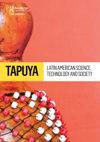The technology of need: technology of sustainability?
IF 1.2
Q2 HISTORY & PHILOSOPHY OF SCIENCE
Tapuya: Latin American Science, Technology and Society
Pub Date : 2022-04-27
DOI:10.1080/25729861.2022.2041789
引用次数: 0
Abstract
Hyper competitiveness accelerates the pace of innovation and generates an impressive increase in the number of products that are introduced in the market daily (Harvey and Griffith 2007). Nevertheless, most of these products are not designed to satisfy basic needs and their distribution among the population is uneven, increasing social exclusion. The technological systems (Hughes 1987) in which innovations take place have, in many cases, evident features of unsustainability. This is because there is an increased use of raw materials and energy to manufacture consumer goods (tangible or intangible) especially those oriented to satisfy the consumption aspirations of a little fraction of humankind. This is supported by an important rise in the capabilities of knowledge production, posing a paradox: on the one side, more efficient technologies are developed allowing the increase of industry and services efficiency which can result in a reduction of the environmental impact. On the other side, it increases the possibility of nature appropriation and transformation, mainly by the intensive exploitation of resources, both traditional (e.g. iron, bauxite, copper, coal, petroleum, limestone, etc.) and new ones (e.g. rare earth, coltan, Lithium salts), and the growing generation of new waste polluting. Therefore, outputs are often unsustainable. This leads to questioning the current sociotechnical structure and the need of exploring alternatives that, inevitably, must induce a rethinking of the notions of technology, production, and consumption. During the sixties and seventies of the past century, there was a debate about development models and the technological systems supporting them. Several studies warned against the negative impacts of technological development and industrial growth, urging for their reorientation (Carson 1962; Meadows et al. 1972; Dickson 1980; Schumacher 1978). Nevertheless, an economic-productive model, based on continuous growth, in需求技术:可持续性技术?
超级竞争力加速了创新的步伐,并在市场上每天推出的产品数量上产生了令人印象深刻的增长(Harvey和Griffith 2007)。然而,这些产品大多不是为满足基本需求而设计的,它们在人口中的分配是不平衡的,增加了社会排斥。在许多情况下,产生创新的技术系统(Hughes 1987)具有明显的不可持续性特征。这是因为制造消费品(有形或无形)的原材料和能源的使用增加了,特别是那些面向满足一小部分人的消费愿望的产品。这得到了知识生产能力显著提高的支持,这构成了一个悖论:一方面,更有效的技术被开发出来,从而提高了工业和服务业的效率,从而减少了对环境的影响。另一方面,它增加了自然占有和改造的可能性,主要是通过对传统资源(如铁、铝土矿、铜、煤、石油、石灰石等)和新资源(如稀土、钶钽铁矿、锂盐)的集约化开采,以及新的废物污染的日益产生。因此,产出往往是不可持续的。这导致了对当前社会技术结构的质疑,以及探索替代方案的需求,不可避免地,必须引起对技术、生产和消费概念的重新思考。在上个世纪的六七十年代,有一场关于发展模式和支持它们的技术系统的辩论。几项研究对技术发展和工业增长的负面影响提出警告,敦促它们重新定位(Carson 1962;Meadows et al. 1972;迪克森1980;舒马赫1978)。然而,以持续增长为基础的经济生产模式
本文章由计算机程序翻译,如有差异,请以英文原文为准。
求助全文
约1分钟内获得全文
求助全文
来源期刊

Tapuya: Latin American Science, Technology and Society
Social Sciences-Social Sciences (all)
CiteScore
1.60
自引率
0.00%
发文量
39
审稿时长
19 weeks
 求助内容:
求助内容: 应助结果提醒方式:
应助结果提醒方式:


